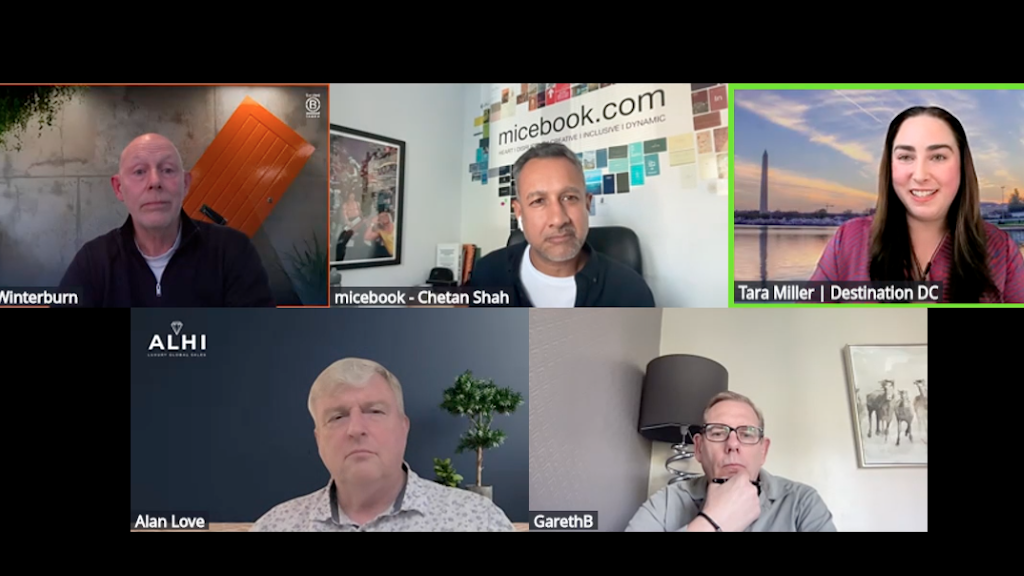Last week’s micebook talks session (our first since the global pandemic) focused on the pressing issue of how tariffs and political rhetoric—especially from the Trump camp—are impacting the global events landscape.
The virtual LinkedIn Live Session, which took place on Wednesday 3 April just hours before President Trump unveiled new tariffs on imports to the US, including a 20% tariff on goods imported from the European Union and 10% for goods imported from the UK.
Hosted by Chetan Shah and featuring insights from Tara Miller (Destination DC), Andrew Winterburn (OrangeDoor), Alan Love (ALHI and Gareth Baldwin (CI Group), the conversation revealed a mixture of challenges, cautious optimism, and strategic adaptations.
Here are a few key takeaways:
1. A Climate of Uncertainty
One clear theme emerged: uncertainty is the new normal. Event professionals are contending with constantly shifting policies and economic signals, making long-term planning and contracting far more complex.
- Clients are hesitant to commit, and contracting is taking significantly longer—sometimes stretching out to 4–6 months.
- Short-term bookings are rising: While larger events are facing delays, smaller, short-lead events (particularly in Europe) are increasing.
2. Tariffs Are Already Biting
From visa restrictions to rising costs for materials, tariffs are having tangible impacts:
- Decline in inbound travel: the US has seen a 70% drop in flights from Canada, with Canadian boycotts having real economic consequences.
- Material cost increases: Events are becoming more expensive to deliver due to tariff-related price hikes on imported goods.
- Impact on incentives: US-based incentive programs are seeing cancellations or budget cuts, particularly when travel involves polarised or politically sensitive destinations.
3. Visa and Employment Restrictions Add More Layers
A key concern raised was the grey area around work visas, particularly for freelancers and agencies delivering production on US soil. Recent enforcement actions—such as removing workers operating under tourist (ESTA) visas—have raised alarm bells. The message: if you’re working in the US, you likely need a proper work visa.
4. Regionalism and Meeting Design Are Shifting
With global mobility under scrutiny, meeting strategies are being reassessed:
- Companies are weighing whether to host meetings regionally, adopt hybrid formats, or lean more heavily on domestic audiences.
- Event planners are now mapping delegate journeys and assessing visa/entry feasibility by country, especially for international conferences.
5. Opportunity Amid the Chaos
Despite the challenges, the panel struck an optimistic tone:
- Europe, Asia, and the Middle East are emerging as growth markets as planners seek alternatives to the US.
- The US itself, despite short-term turbulence, is gearing up for a “mega decade” of global events—from the 2026 FIFA World Cup to the 2028 LA Olympics—which could spur investment in infrastructure and smoother travel policies.
- Disruption may spark innovation and efficiency, especially through tech and AI, as seen in the CI Group’s aggressive adoption of AI for strategy and service delivery.
6. Advice for the Industry
The panel encouraged event professionals to:
- Stay informed and proactive—monitor visa changes, tariff updates, and delegate sentiment.
- Lean on destination partners and CVBs—especially for communication support, toolkits, and local insight.
- Diversify client bases and geographies—look East, explore Europe, and assess where audiences are most accessible.
- Build resilience—avoid over-leveraging, keep debt low, and stay agile to pivot as needed.
The session closed on a hopeful note: watch this space, prepare for the long game, and don’t underestimate the power of events to bridge divides—political, cultural, and geographic. While political disruption adds friction, the industry’s collective strength lies in its ability to adapt, collaborate, and find opportunity in adversity.

